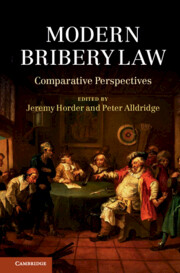Book contents
- Frontmatter
- Contents
- List of contributors
- Table of cases
- Table of statutes and international instruments
- Introduction
- Part I Bribery law: between public wrongdoing and private advantage-taking
- Part II Bribery without borders: tackling corruption in the EU and beyond
- Part III Ill-gotten gains: the challenge of prosecution, enforcement and asset recovery
- Bibliography
- Index
- References
Introduction
Published online by Cambridge University Press: 05 May 2013
- Frontmatter
- Contents
- List of contributors
- Table of cases
- Table of statutes and international instruments
- Introduction
- Part I Bribery law: between public wrongdoing and private advantage-taking
- Part II Bribery without borders: tackling corruption in the EU and beyond
- Part III Ill-gotten gains: the challenge of prosecution, enforcement and asset recovery
- Bibliography
- Index
- References
Summary
This collection of essays from scholars around the world seeks to set the law of bribery in its proper contexts, an especially important task following the enactment of the UK’s Bribery Act 2010 (‘the 2010 Act’). In their separate ways, most of the contributors seek to shift the primary focus away from what has hitherto been a perfectly understandable preoccupation with the implications of the coming into force of the 2010 Act for UK businesses. The preoccupation has been with questions such as: will it still be acceptable to take an important client to see a sports game?; is it lawful to give a present to spouses or partners at corporate functions (or to invite them to such functions at all)?; what can a multinational firm do to ensure that it has adequate systems in place to prevent bribery when the way it does business varies so greatly across the globe?; what should a firm do when asked for an ‘administration fee’ by a hospital overseas in order to ensure that its employees receive treatment if they fall sick? These are all questions of great importance in practice, although they are not new. They have always been difficult questions to answer – sometimes legally, sometimes morally, and sometimes both. The 2010 Act has widely been understood to invite reconsideration of a long-standing willingness on the part of investigators and prosecutors to treat such situations as inappropriate for investigation, or even for guidance on prosecutions. In that respect, though, little is likely to change, even though it is widely accepted that, for example, the impact of sustaining a culture of ‘small’ bribes on the ethics and politics of vulnerable states is ultimately a damaging one. In 2010, the pervasive requirement for such bribes to be paid in Afghanistan for any kind of public service meant that Afghans – many of whom already live far from comfortable lives – were said to be paying US$2.5 billion (a quarter of the country’s GDP) in bribes. The changing role of the prosecutor in bribery cases is a subject central to the final section of these essays.
- Type
- Chapter
- Information
- Modern Bribery LawComparative Perspectives, pp. 1 - 10Publisher: Cambridge University PressPrint publication year: 2013



